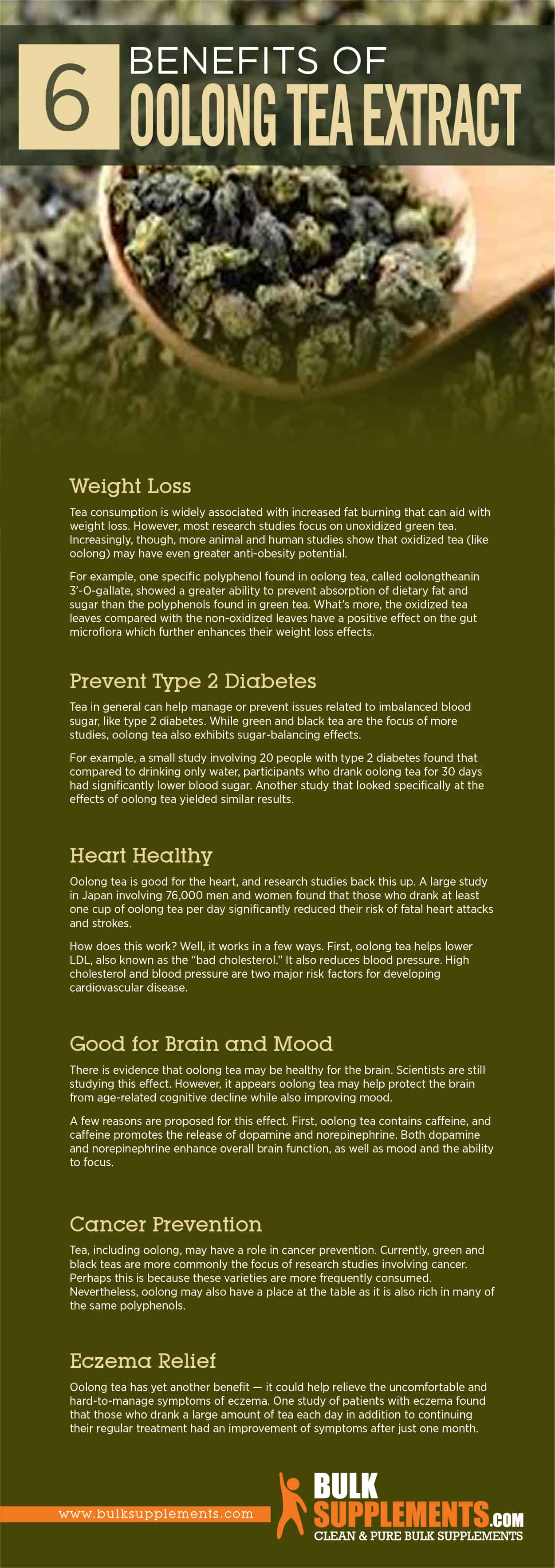Oolong Tea Extract: Benefits, Side Effects & Dosage
by James Denlinger Digital Marketing StrategistTea has been a valuable commodity in cultures throughout the world for thousands of years. Not hard to see why, considering it provides comfort, energy, hydration and a bevvy of useful health benefits.
Many plants can be made into herbal infusions that are commonly referred to as “tea.” However, true tea comes from the beverage made from cured leaves of the Camillia senensis plant native to Asia.
The four main types of tea consumed are black tea, green tea, white tea and oolong tea. These are all made from the the same plant, but have different tastes and nutritional profiles. This is because the leaves are processed a little differently with each variety.
Oolong tea may not be the most popular supplement, but it has tremendous health perks. It can aid with weight loss and blood sugar control, as well as help ward off cardiovascular disease, age-related cognitive decline and even cancer.
What is Oolong Tea Extract?
Oolong tea falls somewhere between green tea and black tea. The leaves are only partially oxidized, unlike those of black tea which are fully oxidized as well as fermented. It’s antioxidant content is also somewhere between green tea and black tea. These antioxidants (or polyphenols), as well as caffeine, give tea some of its health-promoting qualities. And if consumed without sugar, it also has zero calories or fat.
Aside from consuming oolong tea as a beverage, it can also be made into an extract. Oolong tea extracts are dietary supplements that can be powders or liquids and consumed in capsules or added to other foods or beverages.
Benefits of Oolong Tea
Weight Loss
Tea consumption is widely associated with increased fat burning that can aid with weight loss. However, most research studies focus on unoxidized green tea. Increasingly, though, more animal and human studies show that oxidized tea (like oolong) may have even greater anti-obesity potential.
For example, one specific polyphenol found in oolong tea, called oolongtheanin 3′-O-gallate, showed a greater ability to prevent absorption of dietary fat and sugar than the polyphenols found in green tea. What’s more, the oxidized tea leaves compared with the non-oxidized leaves have a positive effect on the gut microflora which further enhances their weight loss effects.
In addition to the unique polyphenols found in oolong tea, its metabolism-boosting effects are also attributed to its caffeine content.
While animal studies are more consistent in their findings, human studies have not been so consistent. It appears that the fat-burning effects of oolong tea may be more pronounced in people with Asian ancestry, as well as those who don’t drink much caffeine in general.
May Help Prevent Type 2 Diabetes
Tea in general can help manage or prevent issues related to imbalanced blood sugar, like type 2 diabetes. While green and black tea are the focus of more studies, oolong tea also exhibits sugar-balancing effects.
For example, a small study involving 20 people with type 2 diabetes found that compared to drinking only water, participants who drank oolong tea for 30 days had significantly lower blood sugar. Another study that looked specifically at the effects of oolong tea yielded similar results.
How does tea work to help manage blood sugar and insulin levels? The polyphenols in tea may help block the absorption of glucose. They may also inhibit glucose production in the liver. While most studies focus on green tea, oolong tea contains the same types of polyphenols.
Heart Healthy
Oolong tea is good for the heart, and research studies back this up. A large study in Japan involving 76,000 men and women found that those who drank at least one cup of oolong tea per day significantly reduced their risk of fatal heart attacks and strokes.
How does this work? Well, it works in a few ways. First, oolong tea helps lower LDL, also known as the “bad cholesterol.” It also reduces blood pressure. High cholesterol and blood pressure are two major risk factors for developing cardiovascular disease.
Good for Brain and Mood
There is evidence that oolong tea may be healthy for the brain. Scientists are still studying this effect. However, it appears oolong tea may help protect the brain from age-related cognitive decline while also improving mood.
A few reasons are proposed for this effect. First, oolong tea contains caffeine, and caffeine promotes the release of dopamine and norepinephrine. Both dopamine and norepinephrine enhance overall brain function, as well as mood and the ability to focus.
Second, research has shown that theanine, an amino acid in oolong tea, may help reduce anxiety and improve brain function. One study found that the combination of theanine and caffeine in tea helps increase the level of alertness better than either ingredient alone.
Additionally, the rich polyphenol content of oolong tea protects brain and nerve cells from oxidative damage.
Cancer Prevention
Tea, including oolong, may have a role in cancer prevention. Currently, green and black teas are more commonly the focus of research studies involving cancer. Perhaps this is because these varieties are more frequently consumed. Nevertheless, oolong may also have a place at the table as it is also rich in many of the same polyphenols.
Studies suggest that tea, especially green tea, may help reduce the risk of esophageal, lung, liver, oral and pancreatic cancer. Scientists believe the polyphenols, which are antioxidants, help prevent cells from turning cancerous and reproducing.
This is very promising, but researchers don’t have enough information yet to recommend any specific way to use tea to prevent or treat cancer.
Eczema Relief
Oolong tea has yet another benefit — it could help relieve the uncomfortable and hard-to-manage symptoms of eczema. One study of patients with eczema found that those who drank a large amount of tea each day in addition to continuing their regular treatment had an improvement of symptoms after just one month.
 PIN IT
PIN ITOolong Tea Extract Side Effects and Dosage
Side Effects of Oolong Tea Extract
Despite providing a laundry list of health benefits, oolong tea extract certainly isn’t perfect. Like most supplements, it does come with some common, but minor side effects.
Headache and Anxiety
Because oolong tea contains caffeine, it isn’t uncommon to deal with headaches after consumption. Moreover, those who suffer from severe anxiety may want to avoid consuming oolong tea, as the caffeine can also cause one to overreact to situations of high stress.
Diarrhea
If you are dealing with indigestion, drinking oolong tea may not be the best idea. The caffeine contained within oolong tea may actually worsen symptoms of diarrhea.
Serving Size & Timing
It is best to take 500 mg (scant 1/4 tsp) 1-2 times daily, or as otherwise suggested by a doctor. Though oolong serves as an excellent addition to one’s regimen, it is important to note that it is not a substitute for medical advice from a professional.
The Bottom Line
We’ve all heard about the endless benefits of green tea. But oolong tea, by way of its unique processing, can pack a similar antioxidant punch while offering additional benefits of fermentation. Whether its for weight loss, heart health, energy or longevity, a concentrated extract form makes it easier than ever to get the polyphenols in oolong tea without having to brew and drink several cups a day.
Sponsor Ads
Created on Apr 3rd 2020 15:28. Viewed 546 times.




